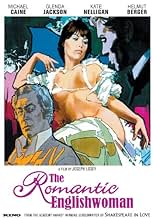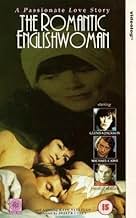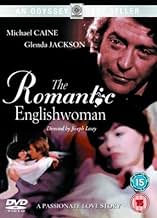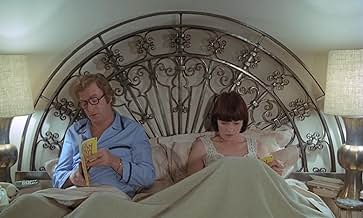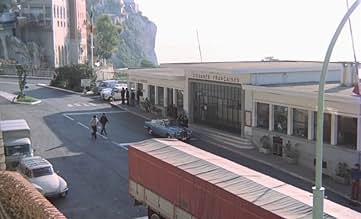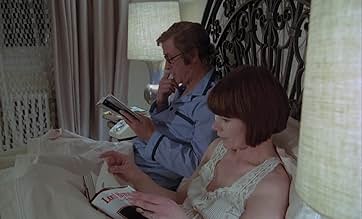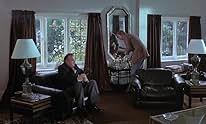VALUTAZIONE IMDb
6,0/10
1567
LA TUA VALUTAZIONE
Aggiungi una trama nella tua linguaA marriage crisis between a writer and his wife leads her to flee to Germany and eventually return with another man, through whom the writer is going to overcome his writer's block.A marriage crisis between a writer and his wife leads her to flee to Germany and eventually return with another man, through whom the writer is going to overcome his writer's block.A marriage crisis between a writer and his wife leads her to flee to Germany and eventually return with another man, through whom the writer is going to overcome his writer's block.
- Regia
- Sceneggiatura
- Star
Michael Lonsdale
- Swan
- (as Michel Lonsdale)
Béatrice Romand
- Catherine
- (as Beatrice Romand)
Reinhard Kolldehoff
- Herman
- (as Rene Kolldehoff)
Recensioni in evidenza
Elizabeth Fielding (Glenda Jackson) returns from spa town Baden Baden, Germany where she met gigolo conman Thomas (Helmut Berger). Her husband Lewis (Michael Caine) is having writer's block and imagines all manners of things his wife is doing. Catherine is the hot nanny. Isabel (Kate Nelligan) is Elizabeth's gossiping friend who Lewis hates. Swan (Michael Lonsdale) is tracking Thomas. Then Thomas shows up at the Fielding home.
The couple never intrigued me. They have limited chemistry. Part of the problem is that the movie starts with them apart. They never really connect for me. Neither is the affair that compelling. There is a coldness to the movie. Maybe it's the intent to show a relationship in trouble. It does it in an uninteresting way.
The couple never intrigued me. They have limited chemistry. Part of the problem is that the movie starts with them apart. They never really connect for me. Neither is the affair that compelling. There is a coldness to the movie. Maybe it's the intent to show a relationship in trouble. It does it in an uninteresting way.
Spa towns seem to have an odd effect on film-makers. Alain Resnais' "Last year in Marienbad", set in the Czech spa town of that name, has a reputation for being bafflingly obscure, so much so that it won itself a place in Michael and Harry Medved's "Fifty Worst Films of All Time". And then there is Joseph Losey's "The Romantic Englishwoman", part of which is set in the German spa town of Baden Baden.
The plot concerns Elizabeth, the "romantic Englishwoman" of the title and the wife of a well-known novelist. While staying in Baden Baden Elizabeth has an affair with a young German named Thomas. Or does she? Is it possible that this "affair" was simply a fantasy on her part? Or does it only exist in the mind of her jealous husband Lewis? Thomas, an admirer of Lewis' work, later comes to stay with Lewis and Elizabeth at their home in England, where Lewis makes him surprisingly welcome for a man who is (or whom he believes to be) his wife's lover. There is also a sub-plot about Thomas' criminal associates, led by a man named Swan, who are pursuing him across Europe, but the exact details remain vague.
There is an adage that one should never judge a book by its cover, and the cinematic equivalent would probably be "don't judge a film by the big names in its title sequence". Even if you have admired the other work of those names. Michael Caine (now Sir Michael) is one of the cinema's greatest stars, appearing in some of the best British films of the sixties, seventies and eighties such as "Alfie", "Get Carter" and "Educating Rita". Glenda Jackson is today best known as a Labour politician, but was a fine actress in her youth. Scriptwriter Tom Stoppard is perhaps Britain's greatest living playwright. Losey was best known to me as the director of "The Go-Between", one of the major British films of the early seventies and one of the films which started the "heritage cinema" movement.
Unfortunately, all this assembled talent does not make for a good film. "The Romantic Englishwoman" goes to show that baffling obscurity was not a monopoly of the Nouvelle Vague and that British art-house film-makers could be just as infuriatingly obscure as their French counterparts. (Losey was American by birth, but I count him as an honorary Briton. He was forced to leave Hollywood during the McCarthy era because of his left-wing sympathies and thereafter worked mostly in Britain). I would not quite count this among my all-time fifty worst films, but it is nevertheless a dull and confusing one which not only lacks a clear storyline but also lacks any perceptible point. There are some films where ambiguity can be a positive virtue rather than a fault, but this is not one of them. 4/10
The plot concerns Elizabeth, the "romantic Englishwoman" of the title and the wife of a well-known novelist. While staying in Baden Baden Elizabeth has an affair with a young German named Thomas. Or does she? Is it possible that this "affair" was simply a fantasy on her part? Or does it only exist in the mind of her jealous husband Lewis? Thomas, an admirer of Lewis' work, later comes to stay with Lewis and Elizabeth at their home in England, where Lewis makes him surprisingly welcome for a man who is (or whom he believes to be) his wife's lover. There is also a sub-plot about Thomas' criminal associates, led by a man named Swan, who are pursuing him across Europe, but the exact details remain vague.
There is an adage that one should never judge a book by its cover, and the cinematic equivalent would probably be "don't judge a film by the big names in its title sequence". Even if you have admired the other work of those names. Michael Caine (now Sir Michael) is one of the cinema's greatest stars, appearing in some of the best British films of the sixties, seventies and eighties such as "Alfie", "Get Carter" and "Educating Rita". Glenda Jackson is today best known as a Labour politician, but was a fine actress in her youth. Scriptwriter Tom Stoppard is perhaps Britain's greatest living playwright. Losey was best known to me as the director of "The Go-Between", one of the major British films of the early seventies and one of the films which started the "heritage cinema" movement.
Unfortunately, all this assembled talent does not make for a good film. "The Romantic Englishwoman" goes to show that baffling obscurity was not a monopoly of the Nouvelle Vague and that British art-house film-makers could be just as infuriatingly obscure as their French counterparts. (Losey was American by birth, but I count him as an honorary Briton. He was forced to leave Hollywood during the McCarthy era because of his left-wing sympathies and thereafter worked mostly in Britain). I would not quite count this among my all-time fifty worst films, but it is nevertheless a dull and confusing one which not only lacks a clear storyline but also lacks any perceptible point. There are some films where ambiguity can be a positive virtue rather than a fault, but this is not one of them. 4/10
The Romantic Englishwoman did hold my attention with its opulent settings and actors of stature, Michael Caine and Glenda Jackson, but the story left me confused. In the movie, we see an English woman named Elizabeth on holiday in Germany at a hotel resort in Baden-Baden, where she has a brief liaison with a handsome European named Thomas played by Helmut Burger. Elizabeth is an elegantly dressed and beautiful woman played by Glenda Jackson, who is married to a successful writer named Lewis Fielding, played by Michael Caine. On Elizabeth's return to England, her husband becomes aware of her friend and invites him to tea at their family home in England. Much of what follows seems to be orchestrated by Lewis who is seeking material for his novel. The extent of the "affair" between Elizabeth and Thomas is difficult to judge since they seemed to barely get to know one another, except for a quick sexual encounter in an elevator. Burger, as the Thomas character, maintains an air of mystery while in Germany and later in England as he becomes an assistant to Caine's character Lewis, doing typing and other secretarial work, and letting the nanny become infatuated with him. It seems that he has no real line of work although he purports to be a poet. Instead, he is a gigolo who consorts with underworld figures and is a skillful thief snatching another guest's overcoat, or removing in-room meals for hotel guests. The relationship between Elizabeth and Thomas seems to blossom as a full affair when they return to Europe, this time in Monaco. Thomas continues to be followed by underworld characters while sharing the affections of wealthy women. Burger lacks the acting persona to play alongside Jackson and Caine. Kate Nelligan and Michael Lonsdale are in the cast; however, their roles amount to little. Beautiful settings aside, the acting of Jackson and Caine cannot rescue this story, whatever the story is.
From the film's title and credits, I had assumed it would be a hysterical melodrama but, in general, I was pleasantly surprised by the result! As expected from this director, it's a stylish film but not an easy one: in fact, it's been likened to Alain Resnais' LAST YEAR AT MARIENBAD (1961) - though it's not quite that mystifying!
Still, the plot does blur the confines which separate fact from fiction, especially in the way novelist/screenwriter Michael Caine bases the affair between a man and a woman who meet while on holiday in a foreign city - and which we see enacted from time to time - on the one he suspects went on between his wife (Glenda Jackson) and a young German gigolo (Helmut Berger) in Baden-Baden. The latter, however, is not as naïve and innocuous as he seems to be; apart from being a crook, when invited by Caine to England, he insinuates himself into the couple's household: charming the nanny who takes care of their child, intriguing the apprehensive Caine (playing a character named Lewis Fielding, whereupon Berger presents himself as an admirer citing "Tom Jones" as his favorite novel - actually written by Henry Fielding!) but who still makes him his secretary, while Jackson is annoyed and evidently uncomfortable with the whole tension-filled set-up.
The three stars are excellent, but Caine's character is especially interesting; curiously enough, when presented with the idea for his script, he finds it boring and proposes to change it into a suspenser but, after realizing that the drama held greater resonance for him than he had anticipated, he is unaware of the parallel thriller subplot wherein Berger falls foul of his criminal associates (led by the smooth Michel Lonsdale)! The cast also features Rene' Kolldehoff (as Caine's extravagant producer), Nathalie Delon (severely underused, despite her "Guest Artist" credit) and Kate Nelligan (as a gossipmonger friend of the Fieldings).
The script by Tom Stoppard and Thomas Wiseman (from the latter's novel) is actually very funny, particularly Caine's explosive put-down of Nelligan on her very first appearance (though when Jackson eventually leaves him for Berger, she goes to see how he's doing and they make up), a society dinner in which Caine ends up drunk and Delon is mistaken for a hooker and, again, Caine's close encounter with gangster Lonsdale. Here, Losey also does some interesting things with his camera (Gerry Fisher was the cinematographer) and Richard Hartley's score is notable, too.
I've only watched this and MR. KLEIN (1976) from Losey's final period (1972-85), during which there were evident signs of decline; even if overlong and emerging, ultimately, as a lesser work, the film is more enjoyable - and rewarding - than could be gleaned from a mere reading of its synopsis...
Still, the plot does blur the confines which separate fact from fiction, especially in the way novelist/screenwriter Michael Caine bases the affair between a man and a woman who meet while on holiday in a foreign city - and which we see enacted from time to time - on the one he suspects went on between his wife (Glenda Jackson) and a young German gigolo (Helmut Berger) in Baden-Baden. The latter, however, is not as naïve and innocuous as he seems to be; apart from being a crook, when invited by Caine to England, he insinuates himself into the couple's household: charming the nanny who takes care of their child, intriguing the apprehensive Caine (playing a character named Lewis Fielding, whereupon Berger presents himself as an admirer citing "Tom Jones" as his favorite novel - actually written by Henry Fielding!) but who still makes him his secretary, while Jackson is annoyed and evidently uncomfortable with the whole tension-filled set-up.
The three stars are excellent, but Caine's character is especially interesting; curiously enough, when presented with the idea for his script, he finds it boring and proposes to change it into a suspenser but, after realizing that the drama held greater resonance for him than he had anticipated, he is unaware of the parallel thriller subplot wherein Berger falls foul of his criminal associates (led by the smooth Michel Lonsdale)! The cast also features Rene' Kolldehoff (as Caine's extravagant producer), Nathalie Delon (severely underused, despite her "Guest Artist" credit) and Kate Nelligan (as a gossipmonger friend of the Fieldings).
The script by Tom Stoppard and Thomas Wiseman (from the latter's novel) is actually very funny, particularly Caine's explosive put-down of Nelligan on her very first appearance (though when Jackson eventually leaves him for Berger, she goes to see how he's doing and they make up), a society dinner in which Caine ends up drunk and Delon is mistaken for a hooker and, again, Caine's close encounter with gangster Lonsdale. Here, Losey also does some interesting things with his camera (Gerry Fisher was the cinematographer) and Richard Hartley's score is notable, too.
I've only watched this and MR. KLEIN (1976) from Losey's final period (1972-85), during which there were evident signs of decline; even if overlong and emerging, ultimately, as a lesser work, the film is more enjoyable - and rewarding - than could be gleaned from a mere reading of its synopsis...
Glenda Jackson's frustrated bourgeois housewife, having gone to the spa town of Baden-Baden for unspecified reasons, maybe or maybe doesn't have a brief affair with Helmut Berger's young gigolo. In town on a botched drug deal, Berger operates through a combination of what we might term freelancing: as a car or drug smuggler but, it seems, principally as a gigolo whose opening line is that he's a "poet". Meanwhile, back in British suburbia, Jackson's husband, writer Michael Caine abandons plans to work on a novel to begin a screenplay based on his jealous imaginings of his wife's Baden-Baden sojourn. When Berger telephones Caine to announce that he's an admirer of his work and turns up (literally) "for tea", the stakes are set for the triangle to play out, with the added drama in the final third of Berger's drug connections, among them the poker-faced, and sadly under-used, Michael Lonsdale, turning up in a kind of lugubrious pursuit.
During the 1960s and 70s, Joseph Losey reinvented himself from a filmmaker of social problem pictures and taut, gritty noirs, to an arthouse director, with mixed results. In some cases-notably his collaborations with Harold Pinter, 'Accident' and 'The Go-Between'-formal innovations-particularly Alain Resnais-style temporal ambiguity-were closely allied to a dissection of the British class system. In others, such as the camp classics 'Boom!' or 'Secret Ceremony', it's not clear exactly *what's* going on-and not necessarily in a good way. Essentially, what we watch is a set of variations on a theme, more or less successfully rendered. Take the use of flashbacks and flashforwards: longer or shorter inserts of scenes whose relation to the main narrative is not immediately revealed, used particularly good effect in the late '60s/early '70s Pinter collaborations 'Accident' and 'The Go-Between'. In 'The Romantic Englishwoman', the flashbacks/forwards centre on an incident that occurs near the start of the film: the moment Jackson and Berger take a lift together in their hotel and may or may not initiate a sexual relationship. This incident is a way to explore the boundaries between action and desire, and various real or imaginary pairings of the heterosexual couple and a third partner. What happened in the lift in Baden-Baden? From whose perspective do we see this?
As the film goes on, though, not much done is to expand these initially intriguing ideas. The film couldn't easily be called either a feminist or an anti-feminist film: Caine's obnoxious outburst at Jackson's friend, a visiting gossip columnist, for repeating feminist statements about female homemaking roles, is clearly absurd, yet, like Jeanne Mourea's Eve, Jackson's dreams of liberation from marriage can occur only through another man, offering no real possibility of sociability outside the heterosexual contract. We thus simultaneously watch the playing out of male jealousy and of Jackson's "romantic" desire for escape--the doomed template of much melodrama. Too often, though, the film simply *presents* this double-bind, offering little other perspective on what we already know. The flashback-flashforward structure insists on the claustrophobic way in which its characters play out pre-ordained social roles, yet it has little to say *about* such roles, apart from telling us that they exist. The result: a film that ultimately feels "cold", dead, an exercise in style.
During the 1960s and 70s, Joseph Losey reinvented himself from a filmmaker of social problem pictures and taut, gritty noirs, to an arthouse director, with mixed results. In some cases-notably his collaborations with Harold Pinter, 'Accident' and 'The Go-Between'-formal innovations-particularly Alain Resnais-style temporal ambiguity-were closely allied to a dissection of the British class system. In others, such as the camp classics 'Boom!' or 'Secret Ceremony', it's not clear exactly *what's* going on-and not necessarily in a good way. Essentially, what we watch is a set of variations on a theme, more or less successfully rendered. Take the use of flashbacks and flashforwards: longer or shorter inserts of scenes whose relation to the main narrative is not immediately revealed, used particularly good effect in the late '60s/early '70s Pinter collaborations 'Accident' and 'The Go-Between'. In 'The Romantic Englishwoman', the flashbacks/forwards centre on an incident that occurs near the start of the film: the moment Jackson and Berger take a lift together in their hotel and may or may not initiate a sexual relationship. This incident is a way to explore the boundaries between action and desire, and various real or imaginary pairings of the heterosexual couple and a third partner. What happened in the lift in Baden-Baden? From whose perspective do we see this?
As the film goes on, though, not much done is to expand these initially intriguing ideas. The film couldn't easily be called either a feminist or an anti-feminist film: Caine's obnoxious outburst at Jackson's friend, a visiting gossip columnist, for repeating feminist statements about female homemaking roles, is clearly absurd, yet, like Jeanne Mourea's Eve, Jackson's dreams of liberation from marriage can occur only through another man, offering no real possibility of sociability outside the heterosexual contract. We thus simultaneously watch the playing out of male jealousy and of Jackson's "romantic" desire for escape--the doomed template of much melodrama. Too often, though, the film simply *presents* this double-bind, offering little other perspective on what we already know. The flashback-flashforward structure insists on the claustrophobic way in which its characters play out pre-ordained social roles, yet it has little to say *about* such roles, apart from telling us that they exist. The result: a film that ultimately feels "cold", dead, an exercise in style.
Lo sapevi?
- QuizSir Dirk Bogarde turned down the role of Lewis Fielding.
- BlooperWhen the Glenda Jackson character first arrives back from abroad and wanders around her home, the camera crew can be seen reflected in the glass of a picture on the wall.
- ConnessioniFeatured in Premio Donostia a Michael Caine (2000)
I più visti
Accedi per valutare e creare un elenco di titoli salvati per ottenere consigli personalizzati
- How long is The Romantic Englishwoman?Powered by Alexa
Dettagli
- Data di uscita
- Paesi di origine
- Lingue
- Celebre anche come
- The Romantic Englishwoman
- Luoghi delle riprese
- Aziende produttrici
- Vedi altri crediti dell’azienda su IMDbPro
Botteghino
- Budget
- 1.200.000 USD (previsto)
- Tempo di esecuzione
- 1h 56min(116 min)
- Mix di suoni
- Proporzioni
- 1.85 : 1
Contribuisci a questa pagina
Suggerisci una modifica o aggiungi i contenuti mancanti



